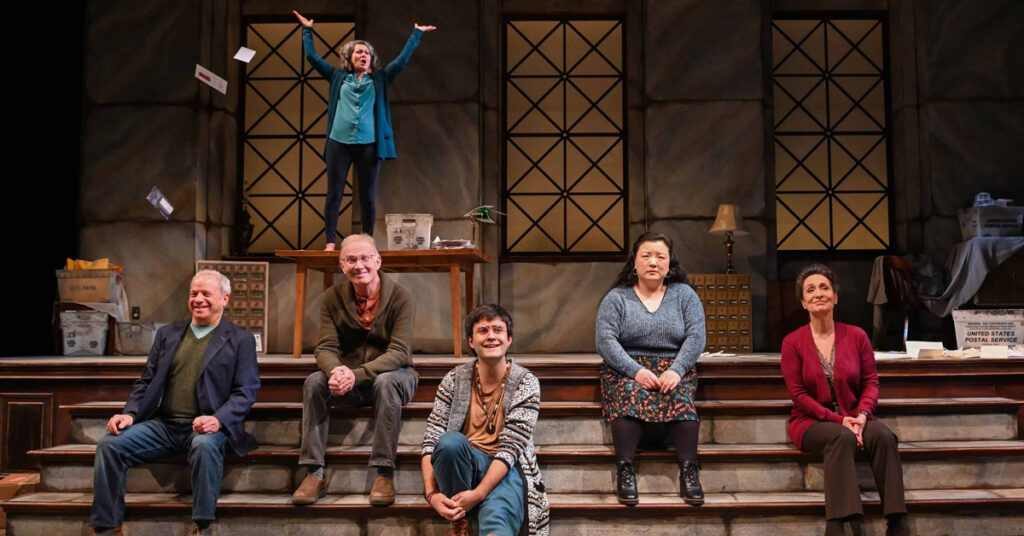
In 2010, writer Cheryl Strayed was offered the opportunity to take up the mantle of Sugar, an advice columnist on the literary website The Rumpus. She reluctantly accepted the unpaid position, and in her column created a space where people could speak openly about their woes in life, love and loss and be received with radical empathy; and, yes, advice, not from any authority on the subjects at hand, but from a fellow ambler down the road of life, infallibly and unapologetically human. As her readers lay themselves bare in their letters, so too did she in her heartfelt responses.
Admittedly, this may come across as a weak premise for a play: a series of letters and responses without any plot tying them together. It speaks volumes to the ability of playwright Nia Vardalos (“My Big Fat Greek Wedding”) and of Director Curt Columbus that Trinity Rep’s production of Tiny Beautiful Things holds the audience’s most rapt attention through its every emotional high and low.
As Strayed, Angela Brazil serves as the solid foundation of the production, answering each letter with grace and alacrity, from a hate letter to the very non-specific WTF, from questions on living through grief to whether to stay faithful in a relationship. Through recounting her own life experiences, she connects with each letter writer (Stephen Berenson, Phyllis Kay, Brian McEleney, Marcel Mascaró and Jenna Lea Scott) and offers the wisdom she has accrued.
Given the personal natures of the letters written to Sugar, some sensitive subjects are addressed, including drug use, abuse, incest and the loss of a child. Some moments are intensely uncomfortable, and anyone who is particularly sensitive to these topics might want to skip this one; some of these are discussed in great detail. But on the other side of these moments, there is healing. There is beauty through the ugliness if one can reach for it.
The play is punctuated with original music by Brown/Trinity Rep student Gunnar Manchester. In keeping with the themes of the play, Manchester opted for a folk-inspired sound, a genre of community and connectedness. The script itself contains moments with a musical feel: the word “love,” the last word Strayed’s mother said to her, clanging like a bell in her chest; the refrain of “go” urging her to leave her first marriage; the mantra of “I am forgiven” repeated until it feels true.
Baron E. Pugh’s set design differs from other iterations of the play by depicting not Strayed’s own home, but an old fashioned post office. Likewise, the letters are received not electronically, as they were in reality, but through sackfuls of physical letters. While less accurate, it emphasizes a kind of connectedness lost in digital communication, and at a time when audiences are more acutely aware than ever of how essential connection is. As the major props of the play, the letters themselves play many roles: blades of grass dropped in the river as an exercise in self-forgiveness; a connection to sever once and for all or to restore; a question hung on the wall as though itching at the back of Strayed’s mind – an elephant in the room waiting to be addressed.
As a further promotion of the lost art of letter writing, and in an effort to further engage the community, audience members are encouraged to write letters of their own to whomever needs to hear from them. These letters can either be posted in a display in the lobby anonymously, placed in a sealed box or taken home. While there will not be any response from Sugar, the exercise gives the audience a chance to take the themes of the play to heart.
As Vardalos wrote of Tiny Beautiful Things, “Sugar and the writers of the letters reveal themselves, and we find ourselves in their conundrums and sorrows, in their lives lived and roads traveled.” Real people wrote these letters, and a real person wrote the responses. Through the veil of anonymity lies a raw honesty, and while throughout the play, letter writers badger Sugar about revealing her true identity, it almost doesn’t matter. What importance lies in a name when the soul has already been laid bare? We don’t have to know her or any of the writers to truly know them. Partly because we are them, and they are us; their pain, their sorrow, their joy – these exist in us, too. In the emotional climax of the play, a grieving father asks Sugar how, in his grief, he can become human again. Sugar responds, “You don’t need me to tell you how to be human again. You are there, in all of your humanity, shining unimpeachably before every person reading these words right now.” Tiny Beautiful Things reminds us of our shared humanity and that while pain is intensely individual, it is also universal, a thread that connects us all – and that is, indeed, a beautiful thing.
Tiny Beautiful Things runs through Feb. 13 in Trinity Rep’s Dowling Theater. For tickets and more information, visit trinityrep.com

